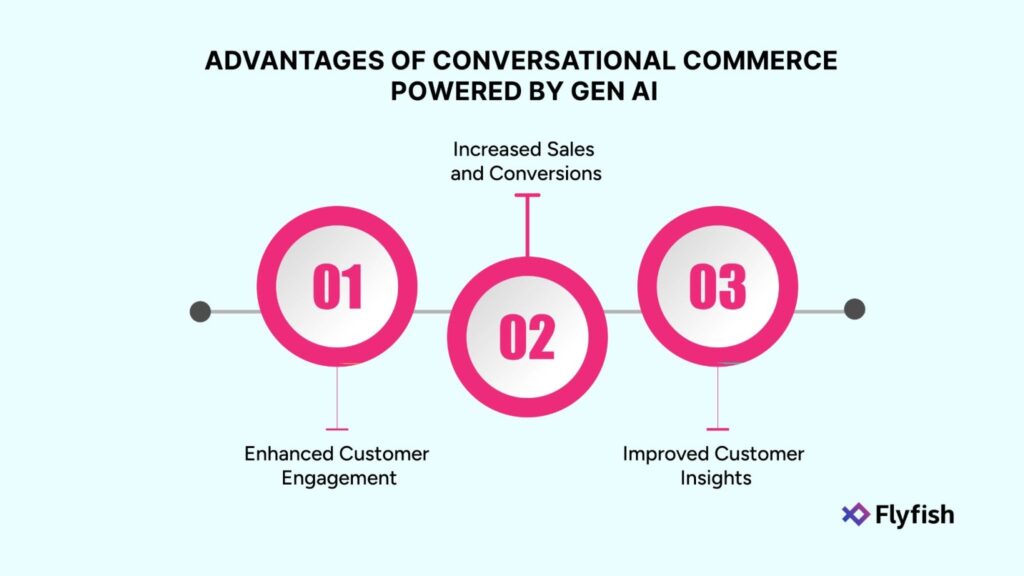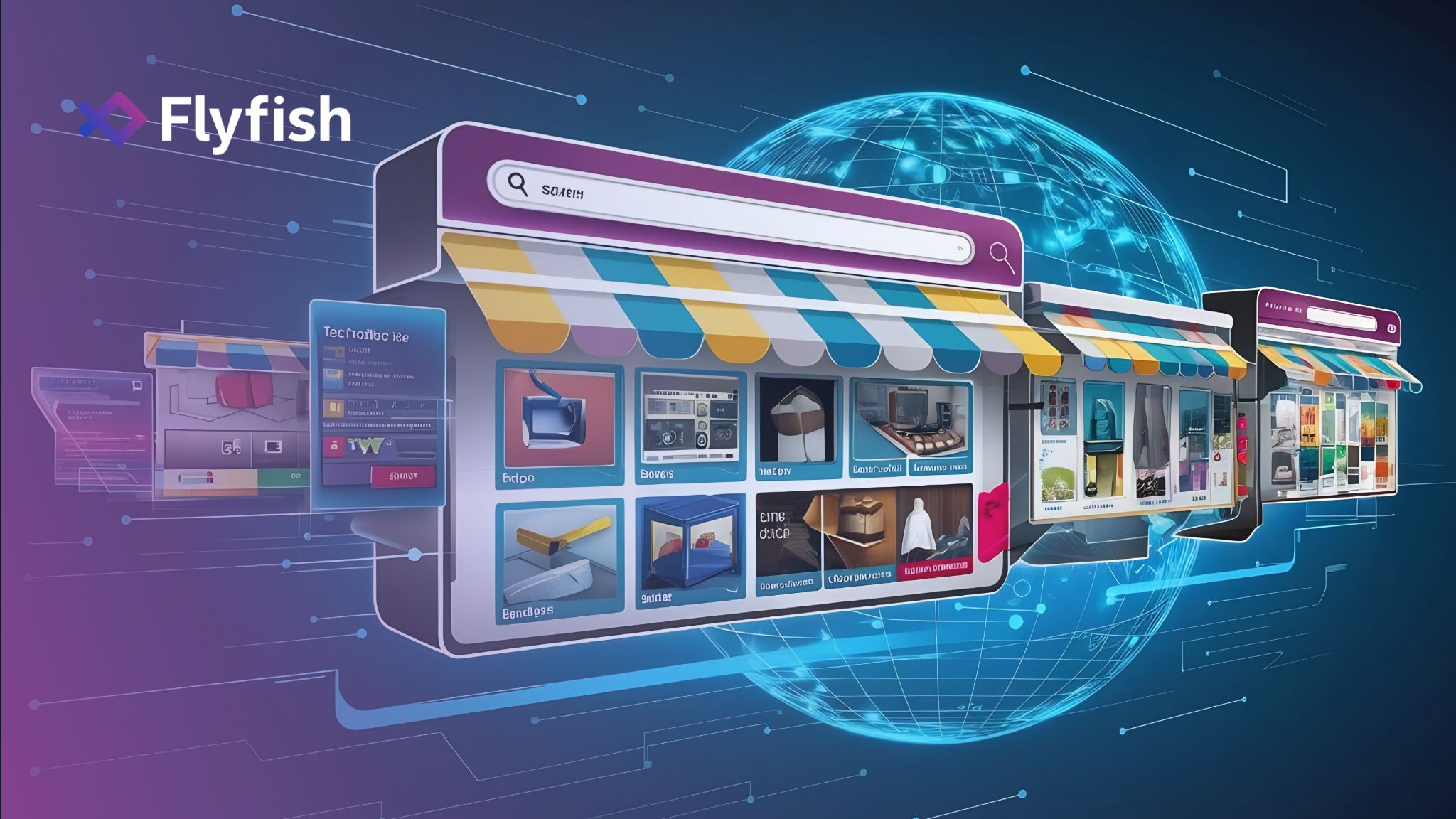
As we look towards the future of conversational commerce, an astounding 75% of ecommerce stores are expected to utilize some form of chatbot by 2025. However, Generative AI in ecommerce represents a monumental leap beyond these initial tools, offering unparalleled personalization and efficiency.
Conversational commerce isn’t just about automating customer service anymore; it’s about creating a dynamic, interactive shopping experience that feels as natural as talking to a human. AI conversational commerce is rapidly setting the stage for a revolution in how we shop online, making every interaction smarter and more intuitive.
In this blog, we’ll explore how Generative AI in ecommerce is transforming the future of conversational commerce, diving deep into how businesses leverage AI to redefine shopping experiences. We’ll examine the core aspects of what is conversational commerce and how AI conversational commerce is shaping the interactions between businesses and consumers in a digital-first world.
The Rise of Chatbots in Commerce
The rise of chatbots marked a significant shift in conversational commerce, enhancing customer interactions by offering round-the-clock service and instant responses. These tools are crucial in streamlining customer inquiries and sales processes, providing a blend of efficiency and accessibility.
However, despite their advantages, chatbots in commerce face limitations such as handling complex queries and providing personalized experiences at the level of human interaction, which Generative AI in ecommerce aims to surpass.
Benefits of Gen AI Conversational Commerce
Generative AI in ecommerce offers significant enhancements over traditional chatbots, reshaping conversational commerce with deeper customer engagement and smarter interactions.

Enhanced Customer Engagement
Generative AI significantly transforms customer interactions in conversational commerce by creating personalized and contextually aware conversations. Unlike traditional chatbots that rely on predefined responses, generative AI in ecommerce understands the nuances of human language and can generate replies that resonate on a more personal level.
This leads to more meaningful interactions, which are crucial for customer satisfaction and loyalty. For instance, an AI beauty advisor could provide personalized skincare recommendations to customers browsing a retail site. By analyzing their skin type and preferences, it simulates the experience of receiving guidance from a knowledgeable salesperson.
Increased Sales and Conversions
Generative AI excels in guiding customers through the sales funnel by providing relevant product recommendations and information, thereby reducing the friction in the buying process. This proactive approach not only improves the shopping experience but also boosts conversion rates.
For instance, by analyzing a customer’s previous interactions and purchases, AI can suggest complementary products, upcoming promotions, and even anticipate future needs, effectively increasing the likelihood of additional sales.
Improved Customer Insights
One of the standout benefits of Generative AI in ecommerce is its ability to gather and analyze vast amounts of data from customer interactions. This data is invaluable for understanding consumer behavior, preferences, and trends.
Retailers can use these insights to optimize their product offerings, adjust marketing strategies, and ultimately, enhance customer experiences. The more a business understands its customers, the better it can serve them, leading to improved customer retention and brand loyalty.
Generative AI vs. Traditional Chatbots
| Aspect | Generative AI | Traditional Chatbots |
| Handling Complex Queries | Capable of handling complex queries | Often struggle with non-standard inquiries |
| Custom Responses | Offers custom responses | Limited in providing tailored responses |
| Adaptability to Context | Adapts to various conversational contexts | Lack contextual understanding and adaptability |
| Relevance of Responses | Provides relevant and contextually appropriate responses | Responses may lack relevance or context |
| Customer Satisfaction | Enhances customer satisfaction | May lead to customer frustration |
For brands like Sephora, employing generative AI has allowed for a more nuanced interaction with customers, offering them beauty advice as personalized as they would get from a live expert. This not only enhances the user experience but also sets a high standard for what digital customer interaction should be.
As AI conversational commerce continues to evolve, businesses are increasingly recognizing the superiority of generative AI over traditional chatbots, seeing it not just as a tool for automation, but as a strategic asset for engaging customers and driving business growth.
Overcoming Challenges in Implementing Generative AI Conversational Commerce
Implementing Generative AI in ecommerce involves navigating a series of challenges, from ethical considerations to technical hurdles. Here, we explore the most common obstacles and offer strategies for successful integration and adoption of AI-driven conversational commerce solutions.
Addressing Privacy, Data Security, and Ethical Considerations
One of the primary concerns with deploying generative AI in conversational commerce is ensuring privacy and data security. In a world where customers are increasingly aware of their digital footprints, the demand for high standards of data protection is non-negotiable.
Businesses must adhere to strict data privacy regulations such as GDPR in Europe and CCPA in California, which provide a framework for handling consumer data responsibly.
Moreover, transparency in how AI interactions are conducted and avoiding bias in AI algorithms are crucial for maintaining ethical integrity and trustworthiness. Companies that fail to implement regular audits and updates to AI systems risk falling behind and losing customer trust.
Overcoming Technical Hurdles and Integration Challenges
Technical implementation of generative AI can pose significant challenges, particularly regarding integration with existing systems. Companies often face issues like software compatibility, data siloing, and ensuring consistent AI performance across different platforms.
To overcome these, choosing AI solutions that are compatible with existing IT infrastructure, or investing in middleware that can seamlessly connect AI tools with current systems is essential.
Employing a phased approach to implementation—starting with pilot projects and scaling up—can help in managing technical risks effectively. Those who hesitate to modernize may find themselves outpaced by competitors who embrace these advanced technologies.
Best Practices for Ensuring Seamless Adoption
For the seamless adoption of AI conversational commerce, businesses should focus on both the technical and human aspects of AI integration. Training staff to work alongside AI, by providing them with the necessary skills to manage and interpret AI operations, is crucial.
Additionally, maintaining an open line of communication with customers about how AI is being used enhances transparency and builds trust. Regularly gathering feedback from both employees and customers can guide further improvements and acceptance. In today’s fast-evolving market, delaying the adoption of generative AI tools could mean missing out on significant opportunities to enhance customer engagement and drive sales.
Don’t let your business fall behind—embrace the future of AI in ecommerce today.
Future Trends in Conversational Commerce
As we look beyond the current capabilities of Generative AI in ecommerce, the future of conversational commerce is poised for further transformative shifts.
Predictions for the Future Beyond Generative AI
Predictions suggest an integration of augmented reality (AR) and virtual reality (VR), enabling customers to interact with products in immersive environments through conversational interfaces.
Additionally, the potential incorporation of blockchain technology could enhance transparency and security in customer interactions, providing a more trustworthy and seamless shopping experience.
Emerging Technologies Shaping the Landscape
Emerging technologies continue to redefine the boundaries of conversational commerce. Advancements in machine learning algorithms are expected to improve the contextual understanding and predictive capabilities of AI systems, making them even more intuitive and effective in customer interactions.
Furthermore, the integration of Internet of Things (IoT) devices with AI conversational interfaces could facilitate an omnipresent shopping assistant, capable of providing real-time assistance and personalized shopping experiences directly from consumers’ smart devices.
These developments promise to make conversational commerce more interactive, personalized, and secure, fundamentally altering how consumers interact with brands and make purchasing decisions online. As technology advances, businesses will need to stay agile and forward-thinking to harness these innovations and maintain a competitive edge in the digital marketplace.
How Flyfish Enhances Conversational Commerce Through Generative AI
Flyfish utilizes Generative AI to redefine conversational commerce, offering a consultative shopping experience that goes beyond traditional customer service. By engaging in a dialogue that seeks to understand each customer’s unique context, Flyfish can deliver highly personalized advice and recommendations.
This process involves sophisticated prompting mechanisms that allow the AI to gather relevant information about customer preferences and needs. The platform then uses this data to tailor recommendations, complete with rationale, ensuring that each suggestion is suited to the individual’s specific circumstances and requirements.
Personalization and Context Understanding
Flyfish excels in personalizing interactions by tailoring recommendations based on intricate customer profiles. Its ability to comprehend and process complex queries allows it to provide responses that are not only relevant but also deeply aligned with the user’s intent and history. This level of understanding facilitates a shopping experience that feels intuitive and uniquely personal.
Seamless Integration
Flyfish seamlessly integrates with existing ecommerce platforms, providing a smooth transition. Its generative AI capabilities enhance the shopping experience without requiring significant changes to existing infrastructure, making it a convenient and effective solution for businesses looking to enhance their conversational commerce offerings.
By integrating these advanced features, Flyfish is setting new standards in the ecommerce space, making shopping as informative and interactive as consulting with an expert salesperson.
Ready to Transform Your Ecommerce Experience?
Unlock the full potential of your online business with Flyfish’s cutting-edge Generative AI platform. Enhance customer interactions, personalize shopping experiences, and drive sales like never before.
Don’t just keep up with the evolution of conversational commerce—lead it! Join the myriad of successful brands that have already revolutionized their customer engagement with Flyfish.
Explore Flyfish’s solutions today and see the difference intelligent AI can make to your ecommerce strategy. Take the first step towards a smarter, more connected shopping experience. Your future in innovative conversational commerce starts here.








































